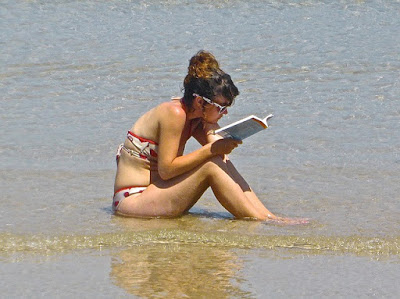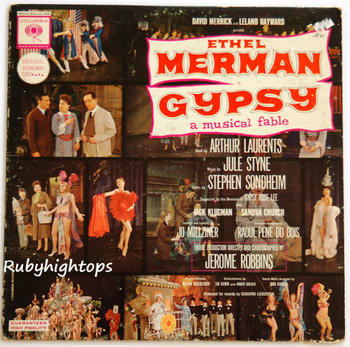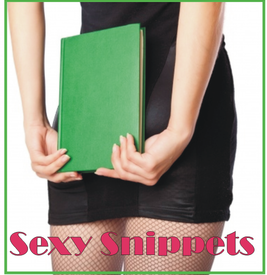By Lisabet Sarai
I have trouble with endings. In fact, I’m having trouble right now, trying to complete my Christmas erotic romance tale so I can get it published before Santa comes down the chimney. The story is currently in the 7K range. I had the main conflict resolved almost 1000 words back, but I can’t quite figure out how to actually wrap it all up, tie it in a nice bow, and write “The End”. Every time I think I’ve got a smart closing line, the characters continue to yack on, and I get increasingly frustrated.
Given my current difficulties, you might suggest that I’m not exactly qualified to give advice about good endings. However, when it comes to an effective finish, I know one when I see one—not to mention recognizing when an author has not succeeded in bringing her story to a clean and compelling end. So let me talk about my observations. Who knows, this might even bring me some insight into my own problem!
The end of a story is arguably less important the initial hook I discussed last month. After all, by the time the reader reaches that point, she has already bought your book, and consumed most of it. On the other hand, the ending is what’s going to stick in the reader’s mind after she shuts the covers or turns off her e-reader. A poorly executed conclusion may convince her not to buy your next book.
An example: I adored Haruki Murakami’s 1Q84. It’s a thick, juicy, enigmatic novel full of unexpected synchronicities and challenging ideas. The last few chapters, however, left me deeply disappointed. Rather than shedding light on the peculiar and perilous alternative world he had created, Murakami simply shunted his main characters back to the “real” world. So many threads were left dangling, so many mysteries remained unsolved, that I wanted to scream. I dropped my rating from an enthusiastic five stars to a grudging four stars. And I started warning people away from the book, or at least cautioning them about its lame conclusion.
What lesson do I take from this experience? Your ending shouldn’t drop the ball. You don’t have to address every one of the reader’s questions (especially if you’re planning a series), but be sure you deliver on the promises you make earlier in the book.
Another no-no: avoid cliff-hangers. Readers hate them. Even if you’re planning a sequel, make sure that the ending gives readers a feeling that one episode has concluded.
I still remember (unhappily) the first book of a BDSM erotic romance trilogy I read three or four years ago. The novel was beautifully written, with a distinctive heroine and a dark, brooding alpha hero who somehow managed to avoid being a cliché. The whole thing was brilliant—until it suddenly ended with the Dom beating the sub until she lost consciousness. That was it. No further information. I was appalled. The Dom wasn’t an evil guy; his ferocity was due to the sort of misunderstanding that’s the common engine of romance. However, this was (in my opinion) a horrible way for the book to end.
I found out later that the trilogy had originally been a single long book. The publishers had cut it into three shorter pieces. I fault their editors, actually, for not realizing that the ending needed to be reworked after the surgery.
Then there are the books that just stop. No suspense, really, but you’re reading along, fully expecting more—and there isn’t any. Drives me absolutely crazy!
Some authors fall into the opposite trap. They continue the story long after its natural end. They appear to believe they must resolve every open issue, tie up every loose end no matter how trivial, explain the fate of every minor character. The book drags on, after the crisis and its resolution, becoming more diffuse and less exciting with each chapter. (This seems to be the problem I’m having.)
To write an effective ending, I think you need to have a clear view of the narrative arc in your tale. Every story—well, most stories in the Western narrative tradition, anyway—have five main phases. In the exposition phase, the author introduces the situation, the characters and the fundamental conflicts that will drive the tale. During the rising action phase, the conflict(s) motivate characters to “do things”. The characters react to each other and to events in or threats from the environment. The climax is where everything starts to fall apart. The literary excrement hits the fan, and the characters make fundamental choices that will determine their future. After the climax, things quiet down quickly, during the so called falling action phase. This is the mopping up stage. Finally, during the resolution or denouement phase, the author brings everything together, to give the reader a sense of satisfaction and completion.
 |
| From Annabel Smith’s Blog |
Stories that suffer from cliff-hanger endings stop the action too soon, in the climax phase. Stories that seem to drag on forever stretch the resolution phase beyond recognition. Stories like Murakami’s play bait and switch. They bring you to the climax, but then pull you down the slope of some different tale altogether.
There’s a symmetry to the traditional narrative arc, even though the earlier phases usually last longer than the later ones. I suspect that the best endings take advantage of this balance. Effective endings refer back to the starting point. They recognize and exploit the patterns of conflict and action from earlier in the book. Like a symphony that repeats a musical theme, but in a different key, the ending echoes or alludes to these patterns, but now they are transformed by the knowledge and progress that have emerged from resolving the conflict.
Writing this has helped to see what might be wrong with my own ending. At the point I am at now, the hero has disappeared off stage, back upstairs to his own apartment. The heroine is conversing with a secondary character, her daughter, who’s judging her for indulging in casual sex.
The story began with the heroine climbing to the floor above her apartment in order to investigate the racket emanating from there. I think it needs to end the same way, with her making her way up the winding stair to the hero’s place. But he’s not a stranger anymore. He’ll meet her at the door (naked, I’m thinking, except for maybe a Santa Claus hat), and draw her inside, where they’ll continue the carnal activities that were so rudely interrupted.
Yeah, that might work. At least it will get the daughter to shut up!
In any case, I think I’ve pontificated long enough on this topic. Happy holidays to all. May your days be merry and bright, and all your endings turn out tight!











